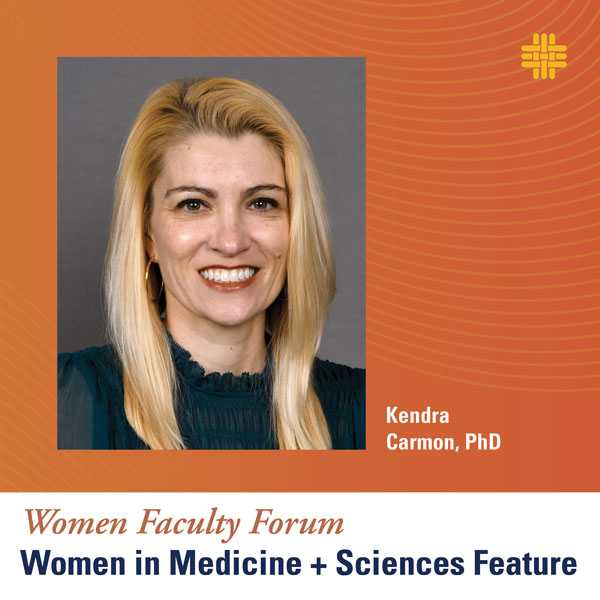Women in Medicine & Sciences Feature: Kendra Carmon, PhD

Each month, the Women Faculty Forum presents its Women in Medicine and Sciences Feature, highlighting the women faculty at McGovern Medical School who are leaders in medicine, research, and education.
This month’s feature is Kendra Carmon, PhD, associate professor in the Brown Foundation Institute of Molecular Medicine’s Center for Translational Cancer Research.
What is your background? When did you join UTHealth Houston?
I was born and raised in the Thousand Islands region on the St. Lawrence River in Upstate New York, near the Canadian border. I grew up in a log cabin in the middle of the woods near a small town called Clayton, N.Y. I was the first in my family to attend and graduate from a 4-year university, earning my BS in chemical engineering at Clarkson University in Potsdam, N.Y. I minored in biology through courses I attended at Columbia University in New York City. Subsequently, drawn to biomedical research, I stayed at Clarkson University to earn my MS in biological chemistry, working on the development of piezoelectric biosensors.
I moved to UTHealth Houston in 2004 to pursue doctoral studies at the University of Texas MD Anderson Cancer Center UTHealth Houston Graduate School of Biomedical Sciences. I joined the laboratory of the late Dr. David Loose in the Department of Integrative Biology and Pharmacology at McGovern Medical School. There, I learned and gained expertise in cell signaling and drug discovery. I conducted my postdoctoral training at the Brown Foundation Institute of Molecular Medicine, where I also started my own independent research program and was eventually promoted to associate professor with tenure in 2022.
What inspired you to pursue a career in science?
Funny enough, I was inspired to pursue science by watching the old black-and-white horror movies. As a little girl, I was intrigued by the mad scientists mixing chemical concoctions and creating monsters in their basement labs. I thought it would be super cool to someday have a laboratory of my own to perform experiments in. Growing up, I really enjoyed chemistry and biology and started to read more on drug discover and development during my undergraduate studies, which solidified the career path I wanted to follow.
What are your current research interests?
My postdoctoral work at the IMM led to the discovery that growth factors called R-spondins are ligands for Leucine-rich repeat-containing G protein-coupled Receptor 5 (LGRF), a seven transmembrane receptor that marks normal stem cells in the gastrointestinal system and cancer stem cells. This was a pivotal breakthrough in the field that subsequently led to a series of other findings that defined the signaling mechanisms and function of LGR5, and helped establish the premise for my independent research program.
During my transition to faculty, innovative therapeutics called antibody-drug conjugates (ADCs) were starting to regain popularity. At that time, we became the first academic group to therapeutically target LGR5 using ADC technology as a strategy to eliminate cancer stem cells for the treatment of colorectal cancer. This work was published near simultaneously with similar results from Genentech, which further validated the approach and earned us recognition in the field. ADCs are now the fastest growing classes of anticancer therapeutics.
Our research interests continue to be focused on investigating the function and signaling mechanisms of LGR5 and other novel cancer targets and developing new therapeutics including ADCs, bispecific antibodies, and unique combination therapies.
Who are your role models?
One role model is my PhD mentor, Dr. David Loose, who was kind, intelligent, supportive, and would always get extremely excited about new scientific discoveries. He made every day I spent in the laboratory genuinely enjoyable. David always let me know how proud he was of me, even when I became faculty, and he truly shaped me into the mentor I am today.
I also am inspired by strong women scientists, like Dr. Carmen Dessauer, that have a passion for what they do, are leaders in their field, and supportive of other women in academia. Throughout my journey, there have been many remarkable individuals who have played a role in me becoming the woman, mentor, and scientists that I am today.
What do you enjoy most about working at UTHealth Houston?
UTHealth Houston is essentially where I was raised and trained to become a successful scientist. I really enjoy the opportunities to continue to interact with supportive mentors and colleagues. Without a doubt, I especially love engaging with the students and mentoring our next generation of scientists.
How do you think UTHealth Houston can further support female faculty?
UTHealth Houston and the Office of Faculty Affairs has always been supportive of female faculty as exemplified by the establishment of the Women Faculty Forum. I believe the institution can continue to create opportunities for networking, highlighting women’s research accomplishments, and promoting female faculty into leadership positions.